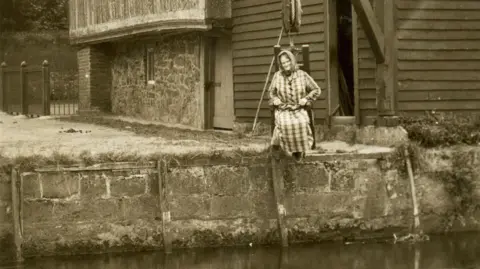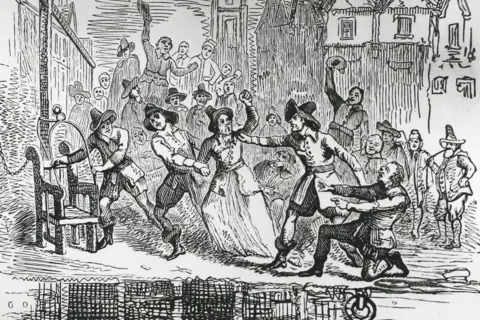Port's weird past, from seal riot to ducking stool
 Getty Images/Underwood Archives
Getty Images/Underwood ArchivesIt was a thriving fishing port, bustling with workers and trade.
But behind this prosperous image, a host of fascinating characters lurked in Grimsby's underbelly during the Victorian era.
Carla Linford, a social historian from the town, has been digging deep into local archives to discover some of the stranger stories from the history of the port.
As she explains on the BBC's Secret Lincolnshire podcast, they include music halls, brothels and – stepping further back in time – a ducking stool.
The seal and the music hall
On Victoria Street is the Savoy Picture House. It is now home to McDonald's, but look above the golden arches and the grand frontage offers clues to its past.
Before the arrival of television and radio, music halls were one of the most popular forms of entertainment.
Built in 1920, the Savoy even features a statue of a Greek muse.
"You must always look up," Carla says. "There is some epic architecture in Grimsby."
Step back a few more decades into the Victorian era and one of Grimsby's most colourful characters was Frederic Hoffman.
The German national was something of a music hall mogul, owning the Victoria in Grimsby in the 1870s and 80s, as well as similar establishments in Cardiff and Liverpool.
But it wasn't all about harmless entertainment.
"His licence was revoked, because he hosted sex workers," Carla says. "It was profitable for him because where the ladies were, the gentlemen would follow."
Hoffman was quite the eccentric.
"He had a pet seal that lived in the music hall," says Carla. "A comedian made disparaging remarks about the seal, so Frederic dropped the curtain on him."
The audience was so enraged by this that a riot ensued and the music hall was smashed up.
Baxter's brothel
In Grimsby, much as in many places where there was a large, male workforce, the sex trade thrived in the second half of the 19th Century.
"If you look at the census for 1861, 1871 – because prostitution wasn't illegal – you will find reams and reams of people, and that is their profession," says Carla, who has researched the stories of some of the women.
"Frances, otherwise known as Fanny, Baxter was a woman from Gayton le Wold, but she was alone with four children. Three of those children died and in 1851 she's listed as a servant living in a house with her daughter.
"By 1861, she owns a brothel just off King Edward Street."

She appears to have been something of a local celebrity.
"She served half a dozen sentences for hard labour, one of them about six months before she died.
"She was witness to so many crimes – stabbings, thefts – she was beaten. Her life was more dramatic than any soap opera.
"But she appears to have kept her spirit. There was one court case where she was called as a witness against a landlord who she would probably have been friends with, and she was sarcastic, she twisted the truth.
"She was queried about why she was coming out of premises out of hours and she turned it around on the police officer who arrested her."
Fanny managed to persuade the court that it was actually the PC who was leaving the brothel.
"The whole courtroom knew what she was doing, and she was just let go."
The ducking stool
To tell one of Grimsby most disturbing stories, we have to step even further back in time to the 17th century.
Freshney Place shopping centre stands on the site of the old Flottergate, which ran down to the Stone Bridge over the river on to Alexandra Road.
"That was the site of the original ducking stool, which was a technique used for keeping errant wives in their place," Carla says.
Women were tied to a wooden chair, paraded through the town in front of crowds and then submerged in the Haven.
"It was done for just being loud, possibly speaking back to you husband," she adds.
 Hulton Archive/Getty Images
Hulton Archive/Getty ImagesOne of the last women to suffer the fate of the ducking stool was Jane Dutch in 1647. By this time the chair had been broken and out of commission for some years, but it was repaired especially for her.
"Jane was ducked multiple times and is quoted of giving an example of her 'fervent eloquence' each time she was raised out of the water, because she just continued to swear.
"When they took her out of the chair, she gave the crowd a flourish and went home."
Despite the humiliating punishment, apparently Jane was unrepentant. It was meant to "put her in her place", says Carla, "like scolding a naughty child".
"It didn't do a lot for Jane obviously," she adds. "She certainly wasn't going to be messed with."
Listen to more episodes from the Secret Lincolnshire series.
Listen to highlights from Lincolnshire on BBC Sounds, watch the latest episode of Look North or tell us about a story you think we should be covering here.
